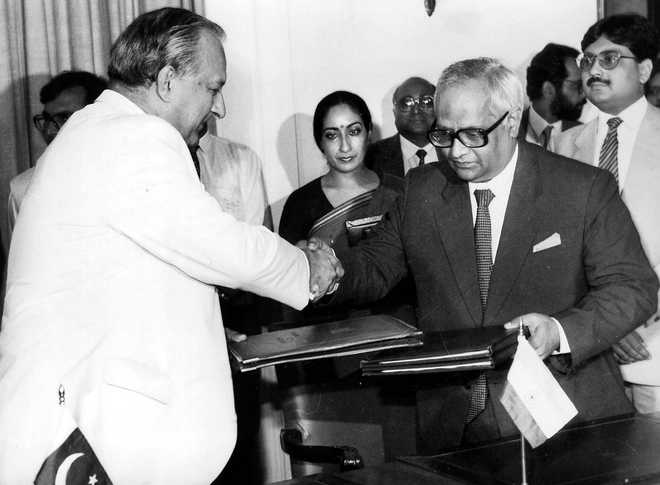
PATHFINDER: The will to set ties right was most intense during NSA Dixit’s tenure.
MK Bhadrakumar
Former Ambassador
THE growing perception in the country is that the India-Pakistan relations have reached a cul-de-sac where they will languish through the rest of the Modi government’s term. Of course, it is a dismal scenario that such a hugely consequential relationship has become unpredictable and dangerous. Keeping an adversarial relationship in a state of animated suspense is at any time extremely challenging. But that happens to be the grim reality.
How did things come to such a pass? Three things must be noted at the outset. First, this is a failure of the ruling party to redeem its 2014 electoral pledge to make India ‘secure’. Second, the breakdown in India’s relations with Pakistan is a manifestation of the spectacular failure of the Modi government’s neighbourhood policies in general. Third, looking ahead, such a somber legacy becomes a serious handicap for Indian diplomacy.
As someone who has only served in the Iran-Pakistan-Afghanistan Division of the MEA in all my headquarters postings during the three decades in the Foreign Service, and having devoted to that work almost a third of my entire professional career, I must say with sadness that never before in the entire chronicle of Independent India, a government is leaving behind such a barren record in engaging with Pakistan. Can it be that not engaging Pakistan was actually the Modi government’s policy?
It is an old adage that a country cannot choose its neighbours. Former Prime Minister Manmohan Singh showed how, despite one of the most cataclysmic events in India-Pakistan ties historically — 26/11 terrorist attacks — the political and diplomatic track still could run its course. The two countries even came breathtakingly close to a resolution of the Kashmir problem. I remember a conversation with the late JN Dixit, just when Manmohan Singh appointed him as the National Security Adviser. Having had the great privilege of enjoying a close association with Dixit and knowing well his structured mind and ‘work ethic’, I took the liberty of asking him what tasks he had set for himself in the new position. Without batting an eyelid, he replied that border settlement with China and a solution to the Kashmir problem would be his topmost priorities, since that was what the PM expected from him.
Due to a variety of factors (which one needn’t go into here) Manmohan couldn’t realise his ‘dream’, but he did travel purposively on that journey and covered a greater distance than any other PM — and, arguably, might even have reached his destination if Dixit had been around. The salience lies here: Manmohan Singh had the ‘big picture’. I recalled this episode intentionally to flag that the present government, on the contrary, has been wandering aimlessly through this past four-year period, lurching from one mishap to another for want of clarity about its destination. Grandstanding and bombastic rhetoric substituted for diplomacy. In his clarion call of war last weekend, the Army Chief, Gen Bipin Rawat, unwittingly flagged the colossal failure of the Modi government to ‘secure’ India. Indians seldom felt so insecure.
Take the latest histrionic. We are invoking the horrific killing of a BSF jawan to rationalise the retreat from Foreign Minister-level talks in New York. But in our selective amnesia, we forget the disparaging personal remarks made by Junior Minister for External Affairs VK Singh regarding PM Imran Khan. We also forget that minister Prakash Javadekar instructed the UGC to direct the country’s universities and higher educational institutions to observe September 29 as the Surgical Strike Day. (Does any civilised country celebrate cross-border violence?) Again, Defence Minister Nirmala Sitharaman glorified the Indian Army as head hunters. And, all this happened before the killing of the BSF jawan, as if on cue from some master conductor — although it was widely speculated in the Indian and foreign media that Foreign Minister-level meeting between India and Pakistan was on the cards in New York in late September. Looking back, knowingly or unknowingly, Irani, Sitharaman and Singh acted as ‘spoilers’.
Furthermore, although the BSF jawan was killed last Tuesday, South Block still maintained two days later on Thursday that the EAM had accepted the Pakistani invitation. Then, in a bizarre somersault, the government overnight took a u-turn. Look at the MEA statement giving two lame excuses and condemning Imran Khan by name. The professionals in South Block couldn’t have drafted such a crude statement. This is not going to be like what Omar Khayyam wrote: ‘The moving finger writes; and having writ…’ What is done will not become the past easily. Imran Khan is only beginning his term in office.
We have decided that the EAM and Qureshi will be at the UN Headquarters but won’t meet. India is the loser. The government has undermined Indian diplomacy at a critical juncture when several interlocking templates are surfacing in regional politics and there is great urgency to engage comprehensively — reset of the US-Pakistan alliance in some form in a near future; the Afghan endgame charioted by the ‘gang of four’ who originally promoted the Taliban (Pakistan, US, Saudi Arabia and the UAE); Saudi investment in CPEC projects; IMF bailout for Pakistan and ensuing conditionalities on CPEC projects; hairline fractures in Sino-Pak relations; US sanctions against China’s defence entities (and implications for Sino-Pak military cooperation); and, overall, Pakistan’s centrality in the geopolitics of the region.
The Modi government is leaving behind an appalling legacy in its failure to engage with Pakistan constructively. And at the root of it all has been the cynical misuse of India’s Pakistan policy as an instinctual impulse and tool of Hindutva politics.



























